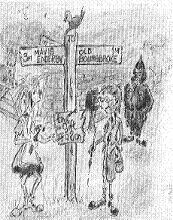
A Saturday night out in Lincoln usually means sitting around in Wetherspoon’s watching youngsters getting tanked up on cheap ale before hitting the clubs, and each other.
But last night was a bit special. An am-dram production of Shakespeare’s Julius Caesar. Now, for all my oft-repeated love of Shakespeare, I don’t think I would fancy sitting with insufficient leg-room watching, say, Cymbeline for three or four hours, especially when performed by amateurs. But Julius Caesar is a lot more accessible, a rattling good yarn in fact and bristles with modern parallels. It’s from the time when Shakespeare was still writing poetic dramas, rather than the dramatic poems of his later years.
I know the play pretty well, having studied it for ‘O’ level and been set several of the speeches to learn. At the same time Keith Michel was playing Antony on TV’s cycle of the Roman plays and a few years later I saw John Neville and Patrick Stewart’s Brutus and Cassius at Stratford. I prepared to watch this performance by revisiting the film of the play starring Brando, Gielgud and Mason. Perhaps that wasn’t particularly fair on the actors due to strut and fret their hour upon last night’s stage.
It’s truism to point out that the scenario of Julius Caesar has been repeated countless times in history. Men with good intentions overthrow a tyranny, only to create not liberty but chaos, from which a greater oppression emerges. Witness the French Revolution, the overthrow of the Tsar, 99% of African states, and – well, let’s reserve judgment on Iraq. Even the arrogant and high-minded Brutus might be right one day.
For me the stand-out performance was Marc Antony, played with bullying authority by a Mussolini lookalike. Cassius, rather wooden, but nicely petulant and scheming, but ultimately weak. Brutus (always a struggle to make him interesting), similar to Caesar himself in his automatic assumption of leadership, but lacking the appropriate ruthlessness and ultimately wrong.
Most of the actors, as so often, had trouble with the verse. I’ve never understood why this should be. After all, it’s not that difficult to grasp and it’s an essential element of the drama. It’s a mistake, with Shakespeare to be too naturalistic. Don’t be frightened of the verse, and don’t speak it too fast.
One last criticism – the last act was rushed through in 10 minutes, with the battle of Philippi described in a half-baked telecast of a news broadcast. I think someone's been watching Baz Luhrman’s Romeo and Juliet recently.
But no more carping. To see a live performance of one of Shakespeare’s best dramas, brimming with characters and conflicting political ideas, was thoroughly enjoyable.
And the curtailed finale meant there was plenty of time for a couple of pints in the pub next door and to listen to a live band. The Hogs, they were called, and bashed out a selection of favourite R&B numbers. Great bass and a mean harmonica. I shall look out for them again.
But last night was a bit special. An am-dram production of Shakespeare’s Julius Caesar. Now, for all my oft-repeated love of Shakespeare, I don’t think I would fancy sitting with insufficient leg-room watching, say, Cymbeline for three or four hours, especially when performed by amateurs. But Julius Caesar is a lot more accessible, a rattling good yarn in fact and bristles with modern parallels. It’s from the time when Shakespeare was still writing poetic dramas, rather than the dramatic poems of his later years.
I know the play pretty well, having studied it for ‘O’ level and been set several of the speeches to learn. At the same time Keith Michel was playing Antony on TV’s cycle of the Roman plays and a few years later I saw John Neville and Patrick Stewart’s Brutus and Cassius at Stratford. I prepared to watch this performance by revisiting the film of the play starring Brando, Gielgud and Mason. Perhaps that wasn’t particularly fair on the actors due to strut and fret their hour upon last night’s stage.
It’s truism to point out that the scenario of Julius Caesar has been repeated countless times in history. Men with good intentions overthrow a tyranny, only to create not liberty but chaos, from which a greater oppression emerges. Witness the French Revolution, the overthrow of the Tsar, 99% of African states, and – well, let’s reserve judgment on Iraq. Even the arrogant and high-minded Brutus might be right one day.
For me the stand-out performance was Marc Antony, played with bullying authority by a Mussolini lookalike. Cassius, rather wooden, but nicely petulant and scheming, but ultimately weak. Brutus (always a struggle to make him interesting), similar to Caesar himself in his automatic assumption of leadership, but lacking the appropriate ruthlessness and ultimately wrong.
Most of the actors, as so often, had trouble with the verse. I’ve never understood why this should be. After all, it’s not that difficult to grasp and it’s an essential element of the drama. It’s a mistake, with Shakespeare to be too naturalistic. Don’t be frightened of the verse, and don’t speak it too fast.
One last criticism – the last act was rushed through in 10 minutes, with the battle of Philippi described in a half-baked telecast of a news broadcast. I think someone's been watching Baz Luhrman’s Romeo and Juliet recently.
But no more carping. To see a live performance of one of Shakespeare’s best dramas, brimming with characters and conflicting political ideas, was thoroughly enjoyable.
And the curtailed finale meant there was plenty of time for a couple of pints in the pub next door and to listen to a live band. The Hogs, they were called, and bashed out a selection of favourite R&B numbers. Great bass and a mean harmonica. I shall look out for them again.




